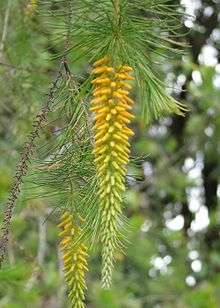Persoonia pinifolia
| Pine-leaved Geebung | |
|---|---|
 | |
| Scientific classification | |
| Kingdom: | Plantae |
| (unranked): | Angiosperms |
| (unranked): | Eudicots |
| Order: | Proteales |
| Family: | Proteaceae |
| Genus: | Persoonia |
| Species: | P. pinifolia |
| Binomial name | |
| Persoonia pinifolia R.Br. | |
| Synonyms | |
|
Linkia pinifolia (R.Br.) Kuntze | |
Persoonia pinifolia, or pine-leaved geebung, is a large shrub which is native to the Sydney region in New South Wales, Australia. It can reach up to 3 metres in both height and width. It has narrow linear leaves to 70 mm long and terminal flower racemes late winter to spring. These are followed by fleshy green fruits (drupes) that have the appearance of a bunch of grapes.
Description
Persoonia pinifolia grows as an upright woody shrub.
Ecology
Unlike most Proteaceae, Persoonia pinifolia does not have proteoid roots.[1]

Cultivation
It is one of the more widely cultivated geebungs in eastern Australia, though by no means common, and is a fairly reliable garden plant. The main reason it is not more widely available is the difficulties encountered in propagation by either seed or cuttings. Seed is very difficult to germinate; a combination of inhibitors and a thick impermeable endocarp contribute to this notorious reputation. Under natural conditions fire appears to enhance germination, though the use of artificial smoke products seem to have no effect on improving the results. It can be assumed fire has a physical effect such as 'cracking' the endocarp or in association with water/rain/moisture improving permeability of the endocarp. It can also be assumed that smoke possibly does improve germination, but artificial conditions don't provide the means for smoke to permeate to the seed embryo. Cuttings have been tried with many combinations of root-inducing hormones along with honey, sugar and coconut milk. The common rooting rate is < 1%. Results like this make the plant an unviable proposition for the professional nurseryperson and the amateur.
Research propagation has been taking place by a nurseryman on the far south coast of NSW during the period 2012-2017. He has consistently been achieving rooting rates of around 85% in trials using a minimum of one hundred cuttings. The scant information released suggests time of year, cutting length, temperature, wounding and hormone grade are important factors to consistently good results.
References
- ↑ Purnell , Helen M. (1957). "Studies of the family Proteaceae. I. Anatomy and morphology of the roots of some Victorian species". Australian Journal of Botany. 8 (1): 38–50. doi:10.1071/BT9600038.
External links
- Association of Societies for Growing Australian Plants (ASGAP): Persoonia pinifolia
- PlantNET – New South Wales Flora Online: Persoonia pinifolia
- Botanic Gardens Trust: Persoonia pinifolia
- Plants for a Future: Persoonia pinifolia